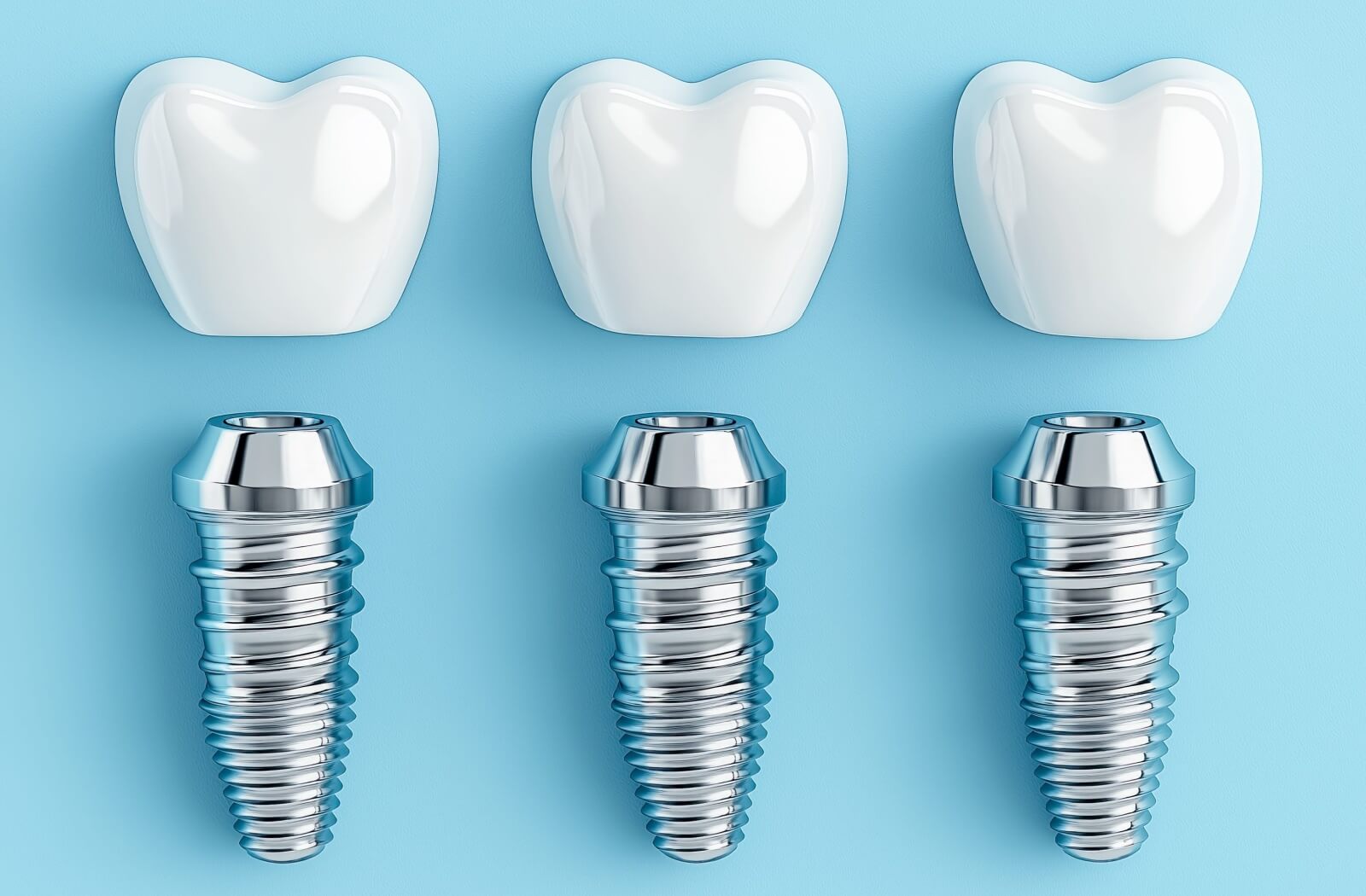If you've been considering dental implants as a solution for missing teeth, you're likely wondering just how long they actually last. Dental implants are an investment, not just in money but in your quality of life, so it’s important that they pay off in terms of your oral and dental health.
Fortunately, when properly cared for, implants can be a long-term fixture in your life. Of course, this depends on various factors, like making sure that you go to all follow up appointments and taking care of your surgical site.

What’s a Dental Implant?
Dental implants are more than just a cosmetic solution; they are artificial tooth roots, often made from titanium, that provide a solid foundation for replacement teeth. Implants are surgically placed into the jawbone, where they fuse with the bone over time through a process called osseointegration, creating a stable base for the new artificial teeth like crowns, bridges, or dentures.
Dental implants blend seamlessly with your natural teeth, ensuring both functional and aesthetic benefits. They also help in preserving your jawbone and maintaining facial structure, both of which can suffer from tooth loss.
Longevity of Dental Implants
The burning question remains—how long do dental implants really last? With proper care, dental implants are designed to be permanent. Note, however, that dental crowns—the artificial teeth that go on top of an implant—often have a lifetime of 15-20 years, after which they may need to be replaced.
At de Man & Höediono Dentistry, we have been restoring, building, and fixing other people's failed implants for over 29 years. We specialize in replaceable teeth for implants by building them so that the top cap or crown can be easily removed, repaired, or replaced.
What Affects Implant Durability
Oral Hygiene
Maintaining good oral hygiene practices is essential both for overall dental health as well as the longevity of implants. This includes brushing your teeth at least twice a day with fluoride toothpaste and flossing daily to remove plaque and food particles from between your teeth. Both of these practices help prevent gum disease and other complications that can arise from poor oral care.
Lifestyle Choices
Certain lifestyle choices can significantly impact the durability of your dental implants.
Smoking, for instance, can hinder the healing process and increase the risk of implant failure due to reduced blood flow to the gums. Similarly, excessive alcohol consumption may interfere with the body’s ability to heal and can lead to complications.
Making healthier choices, such as quitting smoking and moderating alcohol intake, can improve your overall health and enhance the success rates of your dental treatments.
Bone Quality & Quantity
The strength and size of the bone in your jaw are critical to the success of dental implants. Adequate bone density, or strength, provides a stable foundation for the implants to integrate effectively.
In cases where bone quality or quantity is insufficient, bone grafting procedures may be necessary. These procedures involve taking bone from another part of your body or using synthetic materials to augment the jawbone, creating a better environment for implant placement and ensuring long-term stability.
Dentist Experience
Choosing a skilled and experienced dental professional is vital for the success of your dental implants. A qualified dental surgeon will have the expertise to assess your individual needs, plan the procedure meticulously, and address any complications that may arise. Their experience not only affects the immediate success of the implants but also their longevity, as a dentist can provide tailored aftercare and guidance to help maintain your oral health.
Aftercare Check-ups
Routine dental visits are an integral part of maintaining your dental implants and overall oral health. These check-ups allow for the early detection and resolution of potential issues such as gum health or implant integrity before they become more serious problems.
By staying proactive and engaged with your dental care, you can extend the lifespan of your implants and ensure that your smile remains healthy and vibrant for years to come.
Average Lifespan of Dental Implants

Studies show that dental implants boast a success rate of up to 98%. With optimal oral care, dental implants can serve you well for 20 years or more without complications. Avoiding smoking and limiting alcohol further enhances their performance and longevity.
Tips for Maintaining Dental Implants
- Brush and Floss Daily: Use a soft-bristled toothbrush and gentle toothpaste to clean your implants. Floss to eliminate food particles and plaque.
- Avoid Hard Foods: Steer clear of hard foods such as ice or hard candies, which can damage both natural teeth and implants.
- Quit Smoking:Smoking significantly interferes with the healing process by reducing blood flow and oxygen levels in the body. This detrimental effect hampers the body's natural ability to heal and increases the risk of implant failure.
- Regular Dental Appointments: Schedule regular check-ups to keep your implants in top shape.
Why Choose Dental Implants?
Beyond durability, dental implants offer numerous advantages. They provide a lasting solution for missing teeth while also promoting oral health by preventing bone loss and maintaining jaw structure. Other advantages include:
- Natural Appearance: Implants effectively mimic your natural teeth.
- Improved Oral Health: Unlike traditional bridges, implants preserve your natural tooth structure.
- Comfort and Convenience: Implants eliminate the discomfort and inconvenience of removable dentures, offering a secure and permanent tooth replacement option.
Are Dental Implants Right for You?
If you're seeking a durable, long-lasting tooth replacement offering aesthetic and functional benefits, dental implants may be ideal. By maintaining good oral hygiene, making positive lifestyle choices, and keeping up with dental appointments, you can maximize the longevity of your implants.
Remember, each dental situation is unique. To explore more about dental implants, book an appointment with de Man & Höediono Dentistry. With the right steps, your dental implant can last a lifetime, allowing you to smile with confidence.